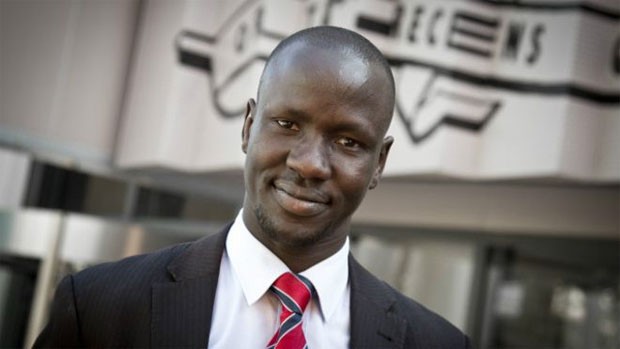The recent comments made by the now renowned South Sudanese-Australian lawyer Deng Adut in the media about the South Sudanese youths, who participated in the recent Moomba brawl in Melbourne has divided the South Sudanese Diaspora community. Whilst the community is united in strongly condemning the violence and antisocial behaviours of these youngsters, some believe that the comments were not just unfair, but they also constituted an attack on the civil rights of these young people, a majority of whom call Australia home
Deng Adut (photo source: sbs.com.au)
Some voices in the community have gone as far as questioning the professional integrity of Mr Adut and his personal story and journey to Australia. However, others believe that Mr Adut, like anyone else, is entitled to his opinion. Voices supporting Mr Adut’s view suggest that he made the comments out of his compassion for his people and that the deportation would help rehabilitate and reform some of the troubled youths and help them become responsible and productive members of the wider community.
Who is Deng Adut?
Deng Adut is a South Sudanese lawyer. He moved to Australia in the late 1990s from Sudan as a refugee. He has been doing quite well in Australia. He studied law at the University of Western Sydney and he was admitted to the Supreme Court of New South Wales in 2011. He is presently practising as a criminal lawyer at AC Law Group- a Western Sydney based private law practice. Mr Adut recently received significant media attention when he was given the honour to speak at the celebration of Australia Day. His speech was widely acclaimed and attracted over 2 million viewers worldwide.
Why is the community outraged by Mr Adult’s comments?
The reason why Mr Adut’s comments appear to have outraged the South Sudanese community is that, as pointed out by counsel Maker Mayek, because the community ‘feels let down’ by someone who is regarded as a role model and who has a powerful voice that should be used to bring about a positive change for critical issues of this type. Indeed, Mr Adut, in his role as an advocate, is a community leader and many people in the community look to lawyers like him to provide an inspiring leadership and help advance the community. This is what the South Sudanese community in Australia expects of Mr Adut and of all other South Sudanese lawyers like him to do, as they serve the community using their skills for different advocacy roles.
Perhaps Mr Adut should have been prudent enough to anticipate the outrage that his comments were going to cause to the community. Suggesting deportation of these youngsters because of a single incident, no matter how outrageous it may look in the eyes of some members of the wider public, is a dangerous proposition. It was incumbent on him to exercise care and judgment to avoid running a commentary in the media about a matter that is the subject of police investigation. While the antisocial behaviours of these youngsters appeared unlawful and inexcusable in all respects, Mr Adut’s comments did not reflect the humanity and compassion expected of him as an a community leader/advocate. His comments were uninformed, harsh and irresponsible for a person of his calibre and his standing in the community, to say the least.
It is pretty obvious that a great deal of damage has been done to the South Sudanese community’s reputation in Australia by the disgraceful acts of these youngsters involved in the Moomba brawl. However, what Mr Adut and the supporters of his view have not yet told us is how the deportation of these youngsters back to South Sudan would effectively help them to rehabilitate. South Sudan is a sovereign nation that has its own enforceable laws and if these youngsters were to be deported back to South Sudan and continued to engage in similar activities or in anything that would be deemed unlawful, it is likely that they would be charged and prosecuted and be subjected to even harsher and crueller punishments than in Australia, given the appalling human rights conditions in the country.
Deng Adut’s comments have sparked worldwide reactions and condemnations. One of the distinguished South Sudanese intellectuals, Professor Jok Madut Jok, an American-educated academic, had this to say on the matter: “I was really shocked to read of Deng Thiak Adut… recommends the deportation of some South Sudanese-Australians who have had run-ins with the law. [I]t does not make sense that Deng Adut should suddenly see himself as the model Australian and the rest should go back to their native lands where crime is a natural way of life“.
To the surprise of many, Mr Adut’s response to various reactions to his comments was quite a desperate attempt to ward off his critics. He stated: “To my critics: I must say that I am feeling your pain as well as your dispirited thoughts. I have heard of your threats and abuses and nay dissuaded. I have learned in my short life that, if your mind is not free to think for yourself, your general knowledge of the things you think you know, maybe short-sighted knowledge. I’ve never claimed to know things that I do not know and I will never assume to know more than you do (as per your barrages of abuses), but I will never be a coward in this life to be spoon-fed by you. I dare you, try me!“
It is clear from the above statement that Mr Adut is bitterly angered by the plethora of reactions to and condemnations of his comments. It is perhaps understandable for him to react in this way, but what Mr Adut does not seem to understand is the hurt and humiliation that his comments have caused to the South Sudanese people in the Diaspora.
One would have hoped that the most appropriate way in which Mr Adut should have responded to the community’s reactions about his comments is to recognise the harsh nature of the comments and their impact on the people affected and take steps to apologise for his statements. Mr Adut, as a human being, is as fallible as any other person and deserves to be forgiven and should be forgiven; but the right and courageous thing for him to do is to accept responsibility for his comments. Many members of the South Sudanese Diaspora community consider his comments as a terrible slur that is causing a great deal of grief in the minds and hearts of many. Mr Adut was asked to apologise for his comments by a number of people on social media, but no response has been received from him as yet. It is unclear whether Mr Adut is contemplating giving an apology or not.
Deportation
There are exceptional circumstances in which those who acquired their Australian citizenship may lose their citizenship under the Citizenship Act 2007 (Cth). These circumstances relate to how a person acquired his or her citizenship (that is whether lawfully or unlawfully), and whether a person has been convicted of a serious offence against Australia’s laws and sentenced to a term of imprisonment of more than one year. There are also provisions for the deportation of non-Australian citizens (permanent residents) under the Migration Act 1958 (Cth). The power to revoke an Australian citizenship or to deport a non-Australian citizen is vested in the Minister of Immigration and Citizenship and is exercised as a discretionary power.
However, there are controversial issues that arise in relation to the revocation of an Australian citizen’s citizenship. These issues are that the laws that give the government the power to revoke an Australian citizen’s citizenship are in contravention of Australia’s international human rights obligations and that ‘having one set of rules for natural born citizens and another for those who acquired citizenship might be discriminatory’.
The individuals involved in the Moomba brawl are understood to be Australian citizens and there is no prevailing case for which they should lose their Australian citizenship. As many have said, the antisocial behaviours in which these young people were involved were disgraceful and have appalled all of us as responsible citizens of this great nation, but such acts would not constitute a serious crime under the relevant law to attract deportation, as Mr Adut has suggested.
Lessons to be learned
There are lessons that should be learned from this incidence, for both the South Sudanese community in Australia and other lawyers alike. Obviously, the incidence has caused the community its reputation and marred its ethnic identity. It is recommended that the community should take practical steps to address the issues of youth delinquency and to avoid the occurrence of such acts in the future. In particular, the community should embark on rehabilitative and educative programs, aim at helping these youngsters get back to normal mode of life and integrate into the Australian mainstream way of life. It is clear, however, that the community does not and would not have the financial capacity to effectively undertake and implement such program, but this is an area where government funding could be sought. Depending on how the program would be designed and run, (if such program would ever be undertaken by the community), the government should be willing to assist since this is another way of addressing and reducing violence in the community.
As noted by the President of the South Sudanese Community Association in Victoria Inc. in his response to the incidence, it is the government’s child protection laws and policies, which take away the children from their parents, which have partly resulted in youth delinquency and homelessness in the South Sudanese community in Australia. That is why the government is partly responsible and should offer to help the community in addressing this issue.
For Mr Adut, this issue has opened a can of worms resulting in people questioning his professional integrity and his personal life story- something he may never have thought would come under scrutiny. It remains incumbent on him to be very careful in the future not to upset the community by prematurely running a commentary in the media on sensitive issues like this. Mr Adut and lawyers, in general, should recognise and seriously take their greater responsibilities for the community and not merely be catalysts on the issues that affect the community. Mr Adut could have offered his good offices and suggested other practical ways of helping the community to address this issue, not deportation, something which is both offensive and impractical.
Atem Deng
Atem Wek Deng is a South Sudanese lawyer. He is presently undertaking further studies in the Australian migration law. He can be contacted through marko.wek@uqconnect.edu.au





